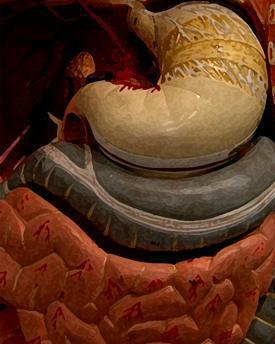
Image adapted from manthatcooks under a Creative Commons license: BY-NC.
The M2 Gastrointestinal Diseases sequence is a 2 1/2 week block of lectures, laboratory exercises, case presentations and a Multidisciplinary Conference that are designed to introduce students to the scientific foundations of diseases that affect the gastrointestinal tract.
Sequence Director:
Rebecca Van Dyke
dScribe: Nikki Selewski
Syllabus
Gastrointestinal Diseases Sequence
Welcome to Gastroenterology. The Gl sequence is a 2 1/2 week block of lectures, laboratory exercises, case presentations and a Multidisciplinary Conference that are designed to introduce you to the scientific foundations of diseases that affect the gastrointestinal tract.
Lectures are intended to emphasize material in the textbooks and to introduce new and supplementary materials. Dr. Van Dyke will be present between lectures and immediately before and after lectures to answer questions. Dr. Van Dyke also will hold half-hour question/problem sessions before the lecture hours on most days to provide further assistance/insight into what you are learning and she will run a review/question-answer session at the end of the sequence. Student questions, case examples and problems will be presented and discussed during these sessions. These sessions are optional and will be tailored to student needs/requests. Please bring in material or cases you have questions about. The cases/x-rays/questions Dr. Van Dyke will provide during these sessions will be available as a PowerPoint presentation on CTools but answers will not be provided since these are intended for student active learning.
Pathology laboratory exercises introduce you to the pathologic basis of gastrointestinal diseases and extend some of the material presented in lectures.
Cases will be discussed in a small-group format to provide you practice in applying knowledge to analyzing patient cases and constructing differential diagnoses and approaches to the evaluation of a patient. Students will work through 15 cases in these small groups. Attendance is required.
The Multidisciplinary Conference is an example of a problem in gastroenterology that is multidisciplinary in nature and that raises important controversial issues in resource allocation, medical policy decisions and ethics. Further, it is designed to illustrate issues relative to both individuals and whole populations as well as non-medical issues of coping with disease. Attendance is required and a patient will be presented, so please remember to dress appropriately.
The lecture by Dr. Michael Mulholland on Tuesday January 31,2012 at 11:10 a.m. is also required as Dr. Mulholland holds an interactive session that cannot be easily replicated by the video tape and Powerpoint presentations. No patient is presented so white coats are not needed.
The lecture by Dr. Rebecca Van Dyke on Thursday, February 9, 2012 at 11:10 a.m. is also required as a patient will be present to talk to the students and take questions. Please remember to dress appropriately.
The Gl sequence differs from some of the other sequences in that we cover a number of different organ systems in a relatively short period of time. Much of the sequence has been organized as modules with coordinated small group discussions and pathology laboratories. The sequence begins with the tubular Gl tract in the first weeks, covers the solid organs and biliary tree in the second week and finishes with coverage of pancreatic disease, some aspects of nutrition, an approach to Gl bleeding and abdominal pain and a summary of some common Gl complaints. We will complete the sequence with several lectures on ENT Day that cover aspects of otolaryngology. These will be given by members of the Department of Otorhinolaryngology.
Attendance at Pathology Laboratories, Small Group Discussions, Dr. Mulholland's lecture on 01/31, Dr. Van Dyke's lecture on 02/09, and the Multidisciplinary Conference on 02/03 is required - material covered in these sessions cannot be readily obtained from textbooks, syllabi and online video/powerpoint presentations.
Attendance at the small group discussions will be assessed from sign-in sheets handed out by your discussion group leaders.
Attendance at the MDC and the two required lectures will be assessed from sign-in sheets placed outside the lecture hall by Joyce Kiger and her staff. They will collect sheets during the first hour of the MDC, so make sure you sign in before, not after, the MDC.
Provision for make-up work is discussed below.
This sequence is complex in nature - PLEASE check the schedules and student group lists on the next few pages and highlight the places you are to go (and the things you are to see) each day. Most mornings are used for 3 hours of lecture, five afternoons are spent in pathology lab and small group discussions and one afternoon, from 1-3 p.m., is spent in a Multidisciplinary Conference.
This package is the syllabus which constitutes lecture handouts and supplements to the lectures contributed individually by the lecturers. Each lecturer has tailored his/her syllabus contribution in a different format. At the beginning of each syllabus contribution is a list of required reading from one or more of the required textbooks for this course. Please do the readings before coming to lecture. PowerPoint presentations by lecturers are also available on the M2 Gl sequence part of CTools. Some of the Powerpoint presentations include complex color artwork. If you want to print out additional copies for your own use, these print out best if you print slides or handout in "color" using a black/white printer rather than printing "grayscale".
In this syllabus you will also receive instructions and the cases for small group discussions. We have included considerable time for small group discussions of specific cases that allow application and reinforcement of principles learned in the lectures and in the text. You've been assigned to a small group with a faculty group leader for these discussions. Please go to the assigned group as we have gone to considerable efforts to make all the groups as small as possible and approximately equal in size to promote better discussion. Please do not ask to switch groups - since you are also supposed to attend the lab sessions, it won't get you out of class any earlier in the day!
Please review the cases before coming to the small group sessions and be prepared to discuss them and ask questions. Please sign an attendance sheet at each session- remind your small group leader if she/he doesn't put one out to use (they have extras in their notebooks).
Reading Assignments
Reading assignments have been made for each lecture/lab from the required text books (Cecil's Essentials of Medicine (201 0, gth edition although the 2007, 7th edition is likely very similar)), Craig and Stitzel Pharmacology (2004, 5th edition) (or other similar pharmacology text) and your pathology text, (Robbins). Because lecture topics do not always fit with the organization of the pathophysiology textbook, assigned pages for each lecture may skip around in chapters and may overlap.
Examination and grading policies - please read this as it should answer questions that may arise during the sequence.
There will be a final written exam with 100-110 questions as well as a separate pathology exam (usually 20 questions).
The pathology exam is written by Drs. Greenson, Appelman and Owens. It covers materials and readings from the pathology labs/pathology syllabus and will include analysis of many images.
The written final exam of 100-110 questions will cover material presented in lectures, course syllabus and textbook readings. A few of the exam questions may require you to look at images, such as x-rays.
Material presented/covered in the small group case discussions, the MDC and Dr. Young's lecture is NOT tested specifically on the final exam. This is to allow flexibility for these exercises and, further, much of the material is not conducive to testing in a multiplechoice format. If you hear something in your small groups or MDCs that seems to contradict something in the textbook or lectures, check with Dr. Van Dyke to resolve it.
The written final and pathology lab exams will be given on line and will be available from Feb 10, 2012 at 5:00p.m. (after the sequence ends) through a sign-on deadline for both exams of Sunday, Feb 12, 2012 at 10:00 p.m. You are allowed 3.5 hours for the written final of 100-110 questions and 1 hour for the pathology laboratory final.
Answers and explanations of the exam answers will be available on line to you once you have submitted your examination responses. In addition, hard copy of the exam answers and explanations will be posted in the glass case in Furstenberg.
Queries are due by Friday, Feb 17 at 8:00 a.m. or as indicated by Cynthia Sharp. Dr. Van Dyke will review all queries and review the relevant educational materials, lecture videos, individual lecturers etc. to address them. Dr. Greenson will review and address any queries on the lab pathology exam.
Dr. Van Dyke also will review the exam results as soon as it is graded and if errors or problems are identified, she will proceed, without waiting for queries, to make appropriate changes in exam grading.
The written final test, which will include questions from lectures, syllabi, and assigned reading, will constitute 81.5°/o of your final grade. The pathology exam constitutes 10% of your grade and is assembled and administered by the pathologists.
The written examinations will consist of multi-choice questions. As is true of much of medicine, we are looking for the single BEST answer, not all possible answers.
Although written examinations are an objective way to measure some aspects of knowledge, they cannot, of course, measure everything we would like you to know after taking this course. Please view them as a way for you to assess whether you have learned at least some aspects of gastroenterology. We do not expect everyone to get every question correct as we have included questions with a range of difficulty. However, exams also can be used as a learning experience. To help you learn from the exam, after the exam, we will post not only the correct answers but also a written rationale for each answer. These brief discussions were prepared by the faculty members who provided lectures and contributed the examination questions.
8.5% of the final grade will come from attendance at the small group discussions and multidisciplinary conference. Attendance at these sessions is required, as the educational value of these sessions cannot be made up by reading texts or notes. Students who miss a discussion group will lose 1.5% off their final grade for each session missed (total of 7 .5% for the 5 sessions) and students who miss the MDC or either of the two required lectures will miss 0.33% of their final grade for each of these.
Make-up for Small Groups, MDC and required lectures - please read this: Students who must miss a small group, MDC or required lectures may make up the required work (and obtain full credit towards their course grade) if do the following: For missed small group discussions, write, for each case, a typed discussion of the case, including an interpretation of the clinical data presented in the case, a differential diagnosis (in order of likelihood) and your approach to confirming the diagnosis. This would usually take up to a page per case, but it can be longer. Therefore if one small group session is missed, three written discussions (one for each case) should be turned in. These should be turned in to Dr. Van Dyke by 1:00 p.m. on Wednesday, February 15, 2012. Send your electronic write-ups by e-mail to Dr. Van Dyke. No late submissions will be accepted.
For missed MDC and missed attendance at the required lectures, you are required to view the streaming video of the session.This should be done as soon as possible after the "missed" presentation but must be done prior to the end of the sequence. You will need to fulfill the requirement on by the end of the day, Wednesday, February 15, 2012.
Grades assigned for the Gl Sequence will follow the Component II guidelines:
Pass: 75.00% or higher
Fail: 74.99% or lower
Guidelines for handling exam question problems have been provided by Dr. Roger Grekin, Director of the M2 year and are as follows:
1. If a question is invalid (for example, no correct answer, unacceptably confusing ) it will be dropped from the examination. No one will get any credit for any answer.
2. If a question is valid but is deemed to be unacceptably difficult as the material was not covered adequately in lecture/syllabus/text, then it will be made a drop/bonus question. If there is a difference of opinion of whether the material was or was not covered, Dr. Van Dyke will confirm this with individual lecturers and, if necessary, will review the relevant lecture videotapes.
3. If more than one answer is equally good, credit will be given for each correct answer. However, as noted above, in medicine there usually is one best answer which constitutes the appropriate way to approach patients, and therefore this situation is uncommon.

Image adapted from manthatcooks under a Creative Commons license: BY-NC.
| Document Title | Creator | Downloads | License |
|---|---|---|---|
|
Syllabus |
Rebecca Van Dyke
|
| Document Title | Creator | Downloads | License |
|---|---|---|---|
|
01.27.12: Malabsorption Clinical Cases |
Rebecca Van Dyke
|
| Document Title | Creator | Downloads | License |
|---|---|---|---|
|
01.25.12: Introduction to GI Sequence |
Rebecca Van Dyke
|
||
|
01.26.12: Diarrhea and Malabsoprtion |
Rebecca Van Dyke
|
||
|
01.27.12: Approach to Diarrhea and Malabsorption |
Rebecca Van Dyke
|
||
|
02.01.12: Liver Tests |
Rebecca Van Dyke
|
||
|
02.01.12: Review of Liver Physiology - Structure-Function Relationship |
Rebecca Van Dyke
|
||
|
02.02.12: Appendix Materials - Cholestatis and Hepatitis |
Rebecca Van Dyke
|
||
|
02.02.12: Approach to Liver Disease - Hepatocellular vs Cholestatic Disease |
Rebecca Van Dyke
|
||
|
02.03.12: Appendix Materials - Cholestatis and Hepatitis |
Rebecca Van Dyke
|
||
|
02.03.12: Approach to Liver Disease - Hepatocellular vs Cholestatic Disease |
Rebecca Van Dyke
|
||
|
02.06.12: A GI Smorgasbord - Common GI Problems part I |
Rebecca Van Dyke
|
||
|
02.06.12: Drugs and the Liver |
Rebecca Van Dyke
|
||
|
02.09.12: A GI Smorgasbord - Common GI Problems part II |
Rebecca Van Dyke
|
||
|
Problem Solving Sessions |
Rebecca Van Dyke
|
| Document Title | Creator | Downloads | License |
|---|---|---|---|
|
01.25.12: Introduction to M2 GI Sequence |
Rebecca Van Dyke
|
||
|
01.26.12: Diarrhea and Malabsorption |
Rebecca Van Dyke
|
||
|
01.27.12: Malabsorption of Nutrients |
Rebecca Van Dyke
|
||
|
02.01.12(a): Liver Physiology |
Rebecca Van Dyke
|
||
|
02.01.12(b): Liver Tests - Use and Interpretation |
Rebecca Van Dyke
|
||
|
02.02.12: Hepatocellular Disease |
Rebecca Van Dyke
|
||
|
02.03.12: Cholestatic Liver Diseases |
Rebecca Van Dyke
|
||
|
02.06.12(a): Drugs and the Liver |
Rebecca Van Dyke
|
||
|
02.06.12(b): A GI Smorgasbord - Common GI Problems part I |
Rebecca Van Dyke
|
||
|
02.09.12: A GI Smorgasbord - Common GI Problems part II |
Rebecca Van Dyke
|
||
|
Problem Solving Sessions |
Rebecca Van Dyke
|
| Document Title | Creator | Downloads | License |
|---|---|---|---|
|
01.27.12: Malabsorption Supplementary Information |
Rebecca Van Dyke
|
||
|
02.01.12: Liver Physiology Supplemental Material |
Rebecca Van Dyke
|
||
|
02.01.12: Liver Tests Supplemental Material |
Rebecca Van Dyke
|
||
|
02.02.12: Interpretation of Hepatitis B Serologic Test Results |
Department of Health & Human Services
Centers for Disease Control and Prevention
|



